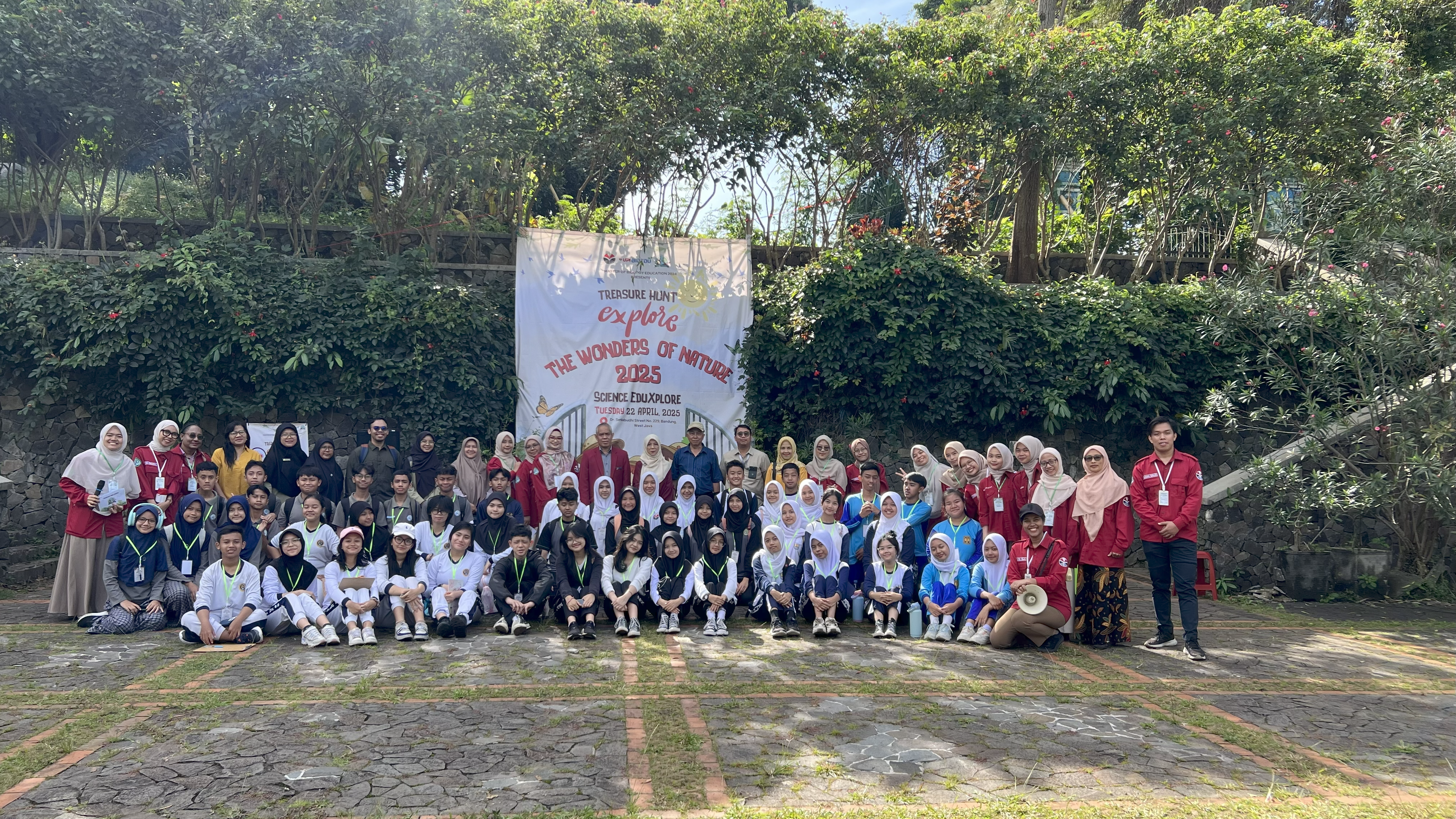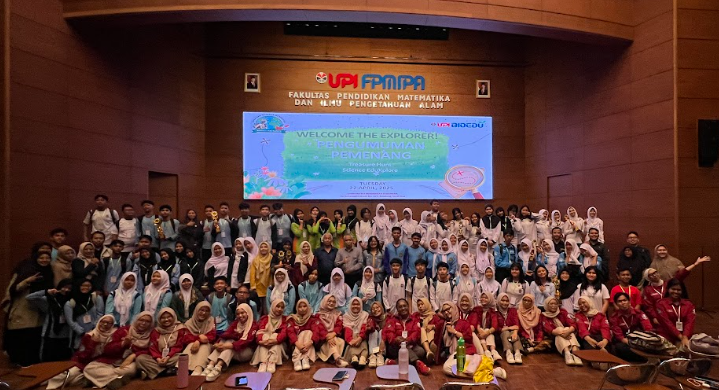21st Century Biology Learning Transformation through Science EduXplore Based Experiential and Cooperative Learning: Best Practices for Collaborative Participatory Classes Bandung
In the midst of rapid advances in science and technology, 21st-century education is required to provide deep transformation, not only in the curriculum but also in learning methods and evaluations. To support the Society 5.0 era, lifelong learning becomes an essential foundation in shaping a generation that is creative, collaborative, and independent (Peea et al., 2024). In response to this, students of the Master’s Program in Biology Education at the Indonesian University of Education (UPI) are organizing an event titled “Science EduXplore: Nature Intelligence Challenge” on April 22, 2025, at the UPI Botanical Garden Laboratory, Bandung.

This activity aims to be an innovative solution to various challenges in learning biology in schools, especially in enhancing science literacy, strengthening scientific process skills (KPS), and fostering students’ scientific identity in accordance with OECD standards (2025), which include the ability to explain scientific phenomena, design investigations, and interpret scientific data in real-world contexts. One approach that can be undertaken is contextual learning, which will provide real experiences for students and give them opportunities to engage directly in the learning process. Thus, learning will become more interesting as it is not only focused on theory, but can also be reinforced with practical activities in the field.
Proposing Contextual Learning: The synergy between theory and practice in strong science literacy cannot be built solely through lectures and theoretical delivery.
Science literacy becomes more meaningful when supported by actions that can demonstrate a particular theory or concept through contextual activities in the field. However, research and observations in partner schools show that this traditional approach still dominates, resulting in low student understanding of biological concepts, especially on ecology themes and environmental issues (Fitrianisa et al., 2024; Muallimatunnisa et al., 2023; Indrawati & Nurpatri, 2022). On the other hand, students show a high interest in learning based on direct experiences. This can be seen from the participants who joined the Science EduXplore activities (number of participants 105).
_(3).png)
_(4).png)
Answering this challenge, Science EduXplore comes with an experiential learning approach that emphasizes direct environmental exploration, as well as cooperative learning that develops collaboration and social interaction in the learning process. Thus, the Science EduXplore activities provide students with the opportunity to develop teamwork, collaboration, and other skills in Biology learning. This activity features five main stations: Weather, Plant Identification, Ayam Cemani, Ecology Laboratory, and Maggot, which are designed to enhance students’ higher-order thinking skills through observation, interpretation, classification, and reflection on the results of exploration.
Collaborative and Contextual Program Design
The Science EduXplore 2025 program design is packaged in the form of a scientific Treasure Hunt activity that combines experiential learning and cooperative learning approaches to strengthen science literacy and 21st-century skills of junior high school students. The activity begins with a briefing and distribution of missions in the Isola courtyard, where participants receive a route map and challenge guidelines. The route map used by participants is intended to equip students with interpretive skills and field observation abilities. Each team follows scientific missions at various stations, such as Climatic Ecology Mission (temperature and humidity measurements), Plant Identification (using Google Lens and sampling), and Ayam Cemani Observation (observation and design ideas for preservation).
Next, participants completed the Microscopic Mission (observation of microorganisms and preparation of leaf tissue), the Edaphic Mission (measurement of pH, temperature, and soil moisture), and the Maggot Cultivation Mission that introduced the role of maggots in organic waste management and bioentrepreneurship opportunities. The activities concluded with a Round Table session, where the entire team presented the results of their exploration and designed science-based solutions for the environmental issues identified. This program not only provided contextual and enjoyable learning but also became an effective alternative to local field trips that .
The participans involved in this activity included several schools in the Bandung City area with a total of 105 participants form 12 schools in Bandung City. In addition, there were 28 students involved working in collaboration with the lecturers from the Biology Education Study Program at UPI along with the PLP laboratory of Biology and the UPI Botanical Garden. This activity is one of the integrated activities in the Bioentrepreneurship Biology course taught by the lecturers Dr. Bambang Supriatno, M.Si and Dr. Sariwulan Diana, M.Si.
Reflections, Challenges, and Improvement Efforts
The Science EduXplore 2025 event received high enthusiasm from participants and accompanying teachers; however, evaluations indicated a number of technical and substantive challenges. Some of the challenges that arose included: sound system disruptions during the opening, ineffective initial briefings, issues with the use of scientific tools, imbalances in time allocation per station, and limited readiness of teaching materials at the plant identification and ecology stations.
This feedback serves as an important foundation for future program development, particularly in strengthening time management, team coordination, the preparation of learning aids, and facilitation strategies at the stations.
Nevertheless, the main objective of the activity—namely providing an environmentally-based and collaborative learning experience—was successfully achieved
Conclusion: Concrete Steps Toward Adaptive Biology Learning
Science EduXplore demonstrates that biology learning does not always have to rely on formal laboratories. With a creative and contextual pedagogical approach, the surrounding environment can become an effective and inspiring learning space. This activity also serves as a real example of the synergy between students, teachers, and lecturers in creating impactful and sustainable biological education innovations.

In line with the spirit of the Merdeka Curriculum, this program not only strengthens students’ cognitive skills but also shapes a caring, collaborative, and responsible scientific character towards the environment. Through the integration of experiential and cooperative learning, Science EduXplore paves the way for meaningful, grounded biology education that is relevant to the challenges of the times.
For complete documentation of activities, it can be accessed through the Instagram account of UPI Biology Education: https://www.instagram.com/p/DI55eBezYB2/?igsh=ZDlqYmJtaXc2b2M5


